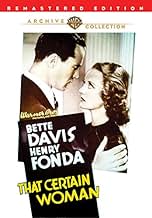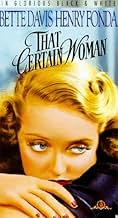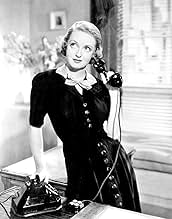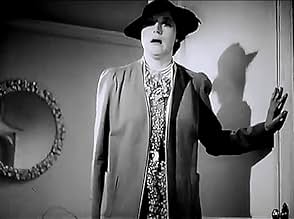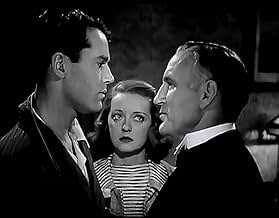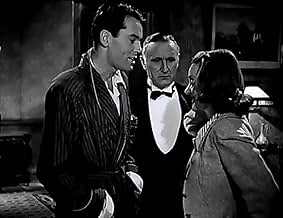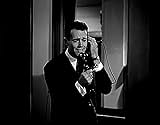ÉVALUATION IMDb
6,4/10
1,8 k
MA NOTE
Ajouter une intrigue dans votre langueMary Donnell, a young legal secretary with a past, elopes with a client's son, but his father has the marriage annulled without knowing she's pregnant.Mary Donnell, a young legal secretary with a past, elopes with a client's son, but his father has the marriage annulled without knowing she's pregnant.Mary Donnell, a young legal secretary with a past, elopes with a client's son, but his father has the marriage annulled without knowing she's pregnant.
- Prix
- 1 victoire au total
Katharine Alexander
- Mrs. Rogers
- (as Katherine Alexander)
Mary Philips
- Amy
- (as Mary Phillips)
Richard DeNeut
- Boy
- (as Dickie DeNeut)
John Hamilton
- American
- (scenes deleted)
Edward Keane
- Opposing Counsel
- (scenes deleted)
Avis en vedette
Yes, it's a ridiculous, confusing plot. Yes, the characterizations are clichéd archetypes. The portrayal of her son shows a child yanked around with what we would see today as neglect, or even cruelty. But David fully commits, and elevates the entire enterprise. She is showcased, and provides a subtlety and range of emotion far beyond the script, e.g., she makes her interaction with the child actor believable. Fonda hangs in there, but his character doesn't give him much to work with. And some scenes rise to her level -- especially the conversation with Anita Louise in her wheelchair. We see the characters reacting to one another in an unlikely and awkward plot contrivance, and simultaneously see two skilled actresses working together to make all this believable and even moving. Plus, the wheelchair action is ... remarkable. Davis looks great, beautifully photographed, well-lit, with the famous eyes showcased repeatedly, to great effect. The finale has to be seen to be believed. What the involved viewer expected - and dreaded - is suddenly revealed to have taken place, and the effect is -- hilarious relief. Certainly not a great film, but essential for those who appreciate and admire Davis.
In spite of it's impressive leads and the usually sure handed direction of Edmund Goulding That Certain Kind of Women is a lumbering, mawkish an implausible melodrama. Disjointed at times you get the feeling a reels missing.
Where do we begin. Ex-moll Mary Donnell is trying to go straight as an executive secretary for Lloyd Rogers who though married has a thing for Mary. Mary though falls for Jack Merrrick Jr. (Henry Fonda) much to the chagrin of Jack Sr. (Donald Crisp) who gets sonny's marriage annulled by playing hardball with her past. The two part he remarries and she has his kid. Years pass, Rogers dies and leaves her a ton of cash. Junior comes back finds out and vows to leave his crippled wife who pays a visit to Mary before they run off. Enough already.
Your drowning in suds in no time in this 30s chick flic that never finds a way to amp up the passion with characters that are tender sensitive and dull beyond belief. Davis stands around looking cow eyed most of the way while Fonda wimps about and Crisp remains stone like. Tina Louise rolls in on a wheelchair in the last act as wife "Flipp" and wrestles with Davis in another cloying moment of tear jerk to see who will make the greater sacrifice. No contest, the audience has.
Where do we begin. Ex-moll Mary Donnell is trying to go straight as an executive secretary for Lloyd Rogers who though married has a thing for Mary. Mary though falls for Jack Merrrick Jr. (Henry Fonda) much to the chagrin of Jack Sr. (Donald Crisp) who gets sonny's marriage annulled by playing hardball with her past. The two part he remarries and she has his kid. Years pass, Rogers dies and leaves her a ton of cash. Junior comes back finds out and vows to leave his crippled wife who pays a visit to Mary before they run off. Enough already.
Your drowning in suds in no time in this 30s chick flic that never finds a way to amp up the passion with characters that are tender sensitive and dull beyond belief. Davis stands around looking cow eyed most of the way while Fonda wimps about and Crisp remains stone like. Tina Louise rolls in on a wheelchair in the last act as wife "Flipp" and wrestles with Davis in another cloying moment of tear jerk to see who will make the greater sacrifice. No contest, the audience has.
This is a superior and under-rated "woman's picture" that really has all the elements of the classic weeper: star-crossed lovers, twists of fate, and self-sacrifice. It also has a sterling performance from Bette Davis which gives a strong indication of why she would soon be a superstar and regarded as the screen's best actress: Her belief in a character could suffuse it with passion and poignancy and transcend the shallowness of the accompanying story. She's supported by an excellent cast - Henry Fonda (in a basically thankless role), the ever-reliable Donald Crisp (her showdown scene with him oddly foreshadows similar scenes with Gladys Cooper in NOW, VOYAGER), Mary Phillips (in a role that in a later version would obviously have gone to Thelma Ritter), who was, at the time, Mrs. Humphrey Bogart (in the same year's MARKED WOMAN Davis would appear with Mayo Methot, the next Mrs. B., and Ian Hunter. Edmund Goulding, who excelled at this kind of thing, wrote and directed it - he would later direct Davis in two other notable soapers, DARK VICTORY (one of her most celebrated performances, as Judith Traherne), and THE GREAT LIE (for which Mary Astor won a Best Supporting Actress Oscar). It's all served up in the best Warner Bros. tradition, but doesn't seem to be as well-remembered as other such films of the era, such as MAGNIFICENT OBSESSION, STELLA DALLAS, or MY FOOLISH HEART.
Bette Davis is "That Certain Woman" in this 1937 remake of "The Trespasser." Davis is the widow of a mobster killed in the Saint Valentine's Day massacre. Now she works for a businessman Lloyd Rogers (Ian Hunter) and uses the name Mary Donnell. She has two men in love with her: her boss Lloyd and a man from a wealthy family, Jack Merrick (Henry Fonda). Knowing who she is thanks to a news story, Merrick's dad (Donald Crisp) is violently opposed to the marriage, but she and Jack marry. They break up right after the honeymoon, thanks to the dad, but during the honeymoon, Mary conceived Jack Jr. Jack goes off to Paris and marries Flip (Anita Louise), not knowing anything about the baby. Meanwhile, the unhappily married Lloyd is hanging around Mary.
Very melodramatic and dated film in the Stella Davis sacrifice vein, with both Davis and Fonda giving excellent performances. Fonda in those days was Jane Fonda with a man's haircut - the resemblance is there for all to see. He's adorable. Also as an actor, he was more energetic and earnest; later, he became more internalized, and in my opinion, less interesting. Davis sports an ugly hair-do (except when she's either just waking up or going to bed).
Very likable stars, and the story will keep you interested, even if it is dated.
Very melodramatic and dated film in the Stella Davis sacrifice vein, with both Davis and Fonda giving excellent performances. Fonda in those days was Jane Fonda with a man's haircut - the resemblance is there for all to see. He's adorable. Also as an actor, he was more energetic and earnest; later, he became more internalized, and in my opinion, less interesting. Davis sports an ugly hair-do (except when she's either just waking up or going to bed).
Very likable stars, and the story will keep you interested, even if it is dated.
Audiences will groan at the character of Mary Donnell. Bette Davis is normally looking out for number one--and she's definitely her good old self in the first half of the movie. The widow of a gangster, Donnell has become a super-competent legal secretary for a respected attorney in a big firm. She fends off unwanted press attention and generally handles herself quite well as a tough single girl in the big city.
She becomes the mistress of her married boss at the law firm (although the Hays Office undoubtedly required the removal of any breath of sexual content here, it should be pretty obvious to all what is going on). In the second half of the movie, which focusses on Jack Merrick (Henry Fonda), whom Donnell has always loved, she achieves peaks of self-sacrifice that will send you staggering to the bathroom to throw up.
This is the sort of film that gives soap opera a bad name.
She becomes the mistress of her married boss at the law firm (although the Hays Office undoubtedly required the removal of any breath of sexual content here, it should be pretty obvious to all what is going on). In the second half of the movie, which focusses on Jack Merrick (Henry Fonda), whom Donnell has always loved, she achieves peaks of self-sacrifice that will send you staggering to the bathroom to throw up.
This is the sort of film that gives soap opera a bad name.
Le saviez-vous
- AnecdotesWith Bette Davis rising quickly through the ranks at Warner Brothers, she was able to choose her leading men, and for That Certain Woman (1937) she chose Henry Fonda. Their lives had intersected a decade earlier when they worked in the same New England summer stock company. Even before that portion of their lives, they had met when Fonda gave the 17-year-old Davis a tour of Princeton University. One night, Fonda later wrote, while he and a friend took Davis and her sister out for a tour of the campus by moonlight, he nervously gave Davis an innocent kiss on the lips. A few days later he received a letter from her: "I've told mother about our lovely experience together in the moonlight. She will announce the engagement when we get home." Fonda was so naïve that he wasn't sure at first whether this was a joke! Davis remembered and liked Fonda enough to request him for this film and then again for Jezebel (1938).
- GaffesThe screen shows a newspaper page with headlines, photographs, and a box in large type, all part of a full-page gangster story. However, only some of the text that can be seen around the edges is part of the story. The rest is "dummy" type, about clothes for college men or electrical equipment.
- Citations
Lloyd Rogers: [to Mary] Money! I've got loads of it, and I'm one of the unhappiest men in the world!
- Générique farfeluThe opening credits roll up.
- ConnexionsFeatured in Breakdowns of 1938 (1938)
- Bandes originales'Cause My Baby Says It's So
(1937) (uncredited)
Music by Harry Warren
Played during the scene at the bar
Meilleurs choix
Connectez-vous pour évaluer et surveiller les recommandations personnalisées
- How long is That Certain Woman?Propulsé par Alexa
Détails
- Date de sortie
- Pays d’origine
- Langue
- Aussi connu sous le nom de
- Aquella mujer
- Lieux de tournage
- société de production
- Consultez plus de crédits d'entreprise sur IMDbPro
- Durée1 heure 33 minutes
- Couleur
- Mixage
- Rapport de forme
- 1.37 : 1
Contribuer à cette page
Suggérer une modification ou ajouter du contenu manquant

Lacune principale
By what name was That Certain Woman (1937) officially released in India in English?
Répondre

